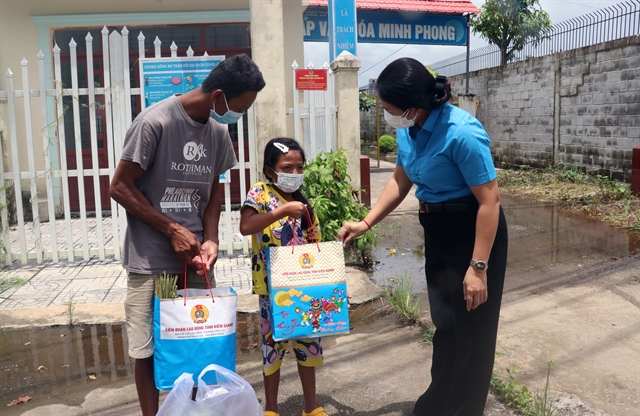 Society
Society

Up to 88 per cent of households across Việt Nam suffered due to the COVID-19 pandemic with those working in the tourism, service and manufacturing sectors the most severely affected.

|
| Representative of the Kiên Giang Labour Federation give food to poor residents in Bình An Commune, Châu Thành District. — VNA/VNS Photo Lê Huy Hải |
HÀ NỘI — Up to 88 per cent of households across Việt Nam suffered due to the COVID-19 pandemic with those working in the tourism, service and manufacturing sectors the most severely affected.
The information was released on Friday in two reports by the United Nations Development Programme (UNDP) assessing of the impact of the pandemic, and the Government's support packages for those hit the hardest.
The reports said that COVID-19 caused heavy losses to the economy and society, especially for vulnerable groups in all 63 provinces and cities in Việt Nam.
In the employment field, three types of impacts were reported including job loss, temporary layoffs, and reduced working hours and income.
The negative impact on employment caused a serious drop in household income. As of July this year, the average income of households decreased by 44 per cent compared to before the COVID-19 outbreak.
The pandemic also affected mental health, food security and housing.
Under such circumstances, the main responses of households were to cut spending, move away from the affected area and increase vaccination coverage.
Representatives at the online conference highly appreciated the efforts of the Vietnamese Government and actions in responding and supporting vulnerable groups.
Nguyễn Thắng, director of the Centre for Analysis and Forecasting under the Việt Nam Academy of Social Science, offered several recommendations.
He proposed to simplify vaccination procedures, adjust the vaccination priority list and increase vaccine supply in both the short and long term.
He also suggested issuing new cash aid programmes with a budget of around five per cent of gross domestic product (GDP) per quarter.
The Government has recently issued many policies to support people affected by COVID-19, including the second support package worth VNĐ26 trillion (US$1.1 billion).
Phạm Minh Thu, a researcher from the Institute of Labour and Social Sciences under the Ministry of Labour, Invalids and Social Affairs said that the support package was timely, but was small in scale for different criteria including funding sources and number of beneficiaries.
She suggested having larger-scale support to meet the minimum standard of living and quickly give help to individuals.
Terence D. Jones, Acting Representative of the UNDP in Việt Nam, expressed his hope that recommendations in the two reports would be considered and applied by the Vietnamese Government and people. — VNS




